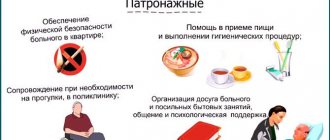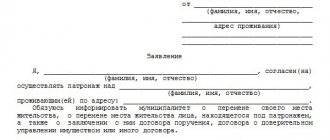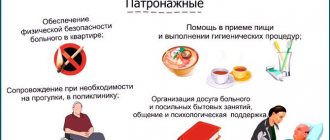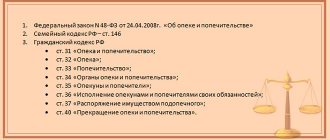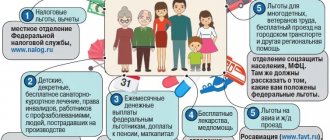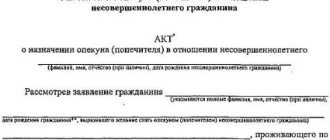Is it necessary to obtain guardianship over an incapacitated person?
In accordance with Art. 31 of the Civil Code of the Russian Federation, guardianship is a way to protect the rights of incapacitated citizens. The guardian must represent the interests of the ward in the courts and government agencies.
Features of registration of guardianship:
- appointed exclusively voluntarily (the guardian must independently initiate the procedure);
- the guardian must meet the requirements established by family and civil legislation;
- the applicant must document compliance with the requirements;
- A guardian is not appointed if the incapacitated citizen is placed in a special institution.
Thus, the appointment of guardianship over an incapacitated person is a mandatory procedure. An exception is provided only for citizens who live in inpatient institutions for the disabled. In this case, the powers of the guardian are vested in the head of the institution.
If a citizen has relatives or other persons who wish to obtain guardianship over him, then they must go through the procedure established by law.
In what cases is guardianship or patronage assigned to a bedridden patient?
A seriously ill bedridden person may be assigned guardianship (trusteeship) or patronage.
Guardianship (trusteeship)
Established over an incompetent or not fully capable adult who, due to mental illness, has lost not only the ability to independently care for himself, but also to be aware of everything that is happening to him, to be aware of his actions, and to make decisions (Articles 32-33 of the Civil Code of the Russian Federation).
Therefore, the guardian not only takes care of the patient in everyday life, but also plays the role of his legal representative, protects his rights and interests.
Patronage
It is established over a capable person who, due to illness or injury, needs an assistant, but at the same time has retained a sound mind, reason, and continues to be aware of himself and his actions (Article 41 of the Civil Code of the Russian Federation).
The responsibilities of such an assistant are only to provide household assistance - he can buy food, do cleaning, give medicine to the patient, but he does not have the right to represent his interests, defend his rights, dispose of his property and income.
An important feature of patronage is that its appointment does not require a court decision declaring the patient incompetent. It is established by written consent of both the assistant and the patient himself (clause 2 of article 41 of the Civil Code of the Russian Federation).
The assistant is not subject to such strict requirements as the guardian. As a rule, patronage can be provided by any close relative of the patient, as well as his friend, neighbor or other stranger.
Often, a close relative of a patient begins to take care of him without contacting the guardianship authority or registering for patronage. But, if the assistant is officially appointed, he will be able to receive monetary remuneration, and the time he works under the contract will count towards his seniority.
Types of guardianship over the incapacitated
In 2021, the law provides for the following types of guardianship over an incompetent person:
- Free. The guardian receives no remuneration. The pension and other income of the ward are transferred to the nominal account of the guardian. He spends them to meet the needs of the incapacitated. The report on expenses made is carried out annually, until February 1.
- Paid. Carried out on the basis of an agreement between the district administration and the guardian. As a remuneration, the guardian receives a certain amount from the pension or other income of the ward, which cannot exceed 5% of the total income.
How to obtain guardianship for a disabled person?
How to obtain guardianship of a child with living parents?
Registration procedure
The algorithm for obtaining guardianship with living parents is no different from accepting an orphan into the family. The only exception will be the case when care of the child has become required due to the incapacity or deprivation of the rights of the biological parents. The procedure for considering a candidate for guardianship is possible only after the court has made an appropriate decision (on deprivation/restriction of rights or status “incapacitated”).
The sequence of actions is as follows:
- Collecting documents, undergoing a medical examination.
- Submitting the package along with the application to the supervisory authority.
- Drawing up a housing inspection report for compliance with accepted standards (within a 3-day period).
- After a positive verdict on the compliance of the home with accepted requirements and standards, the commission begins to study the papers submitted for guardianship.
- Within 10 days the commission is obliged to inform about the decision made.
- If a decision is made to agree on guardianship, the applicant is issued a certificate confirming the legal status.
- This paper is valid for two years, during which the guardian must decide on the child whom he will take into custody.
- After choosing a child, the important moment comes to establish close contact with the ward. If the child is already 10 years old, his or her consent to accept help from a guardian will be required.
The work of the supervisor does not end when transferring care of the ward. Over the next years, regular monitoring and verification of the proper performance of the guardian’s duties will be organized, and if serious violations are identified, government representatives have the right to cancel the guardianship.
How to obtain guardianship over incapacitated people?
The trial to deprive citizens of legal capacity takes place with the mandatory participation of specialists from the guardianship department. After the court decision enters into legal force, the document is sent to the guardianship department. From this moment on, specialists must select a legal representative for the citizen.
Depending on the situation, the following may act as a guardian:
- relatives;
- strangers;
- head of a specialized organization.
The relatives of an incapacitated citizen have priority when choosing a guardian. But they must also express their desire and collect documents.
If you want to arrange guardianship for an elderly relative, you must follow the following procedure:
- Collect documents.
- Deprive of legal capacity.
- Contact the guardianship department.
- Receive a decision on the appointment of a guardian.
The procedure is carried out free of charge. There is no need to pay at any stage.
The duration of guardianship is calculated individually. On average, the procedure will take no more than 4 months.
Deprivation of legal capacity
The issue can be resolved exclusively in court.
You need to prepare the following documents:
- the patient's civil passport;
- outpatient card;
- medical documents confirming registration with a psychiatrist;
- petition for the appointment of a medical examination.
Important! The plaintiff must prove in court that the patient cannot understand the consequences of his actions. To do this, you need to collect all medical information. It is advisable to conduct an examination with a psychiatrist in advance.
The trial takes about 2 months (1 month for the preparation of the process and 1 month for the court decision to enter into legal force). A citizen may be declared incompetent if he has a mental illness or senile dementia (dementia).
List of documents for registration of guardianship
From the moment the court decision is made, it is necessary to begin collecting documents for the appointment of guardianship. The list is provided for by Decree of the Government of the Russian Federation of 2010 No. 927.
When registering guardianship over incapacitated citizens, the following categories of guardians are distinguished:
- relatives who lived with the incapacitated citizen for at least 10 years;
- other citizens.
For the first category, a preferential registration procedure is provided.
They must provide the following data:
- statement;
- document confirming marriage (if the applicant is married);
- passport;
- medical report on health status;
- information about kinship.
Only children, parents, brothers, sisters, grandchildren, and grandparents of the incapacitated person can be included in this category. A prerequisite is cohabitation for a period of at least 10 years.
The second category includes relatives who do not live with the potential ward, and strangers.
They must provide the following information to the guardianship department:
- passport;
- statement;
- autobiography;
- document on the conclusion of a marriage union;
- written consent of all members of the applicant’s family to register guardianship, aged 10 years or older;
- medical report;
- information about the level of income for the last 12 months.
Important! If a citizen is a non-working pensioner, then he does not provide information about income. The guardianship department independently orders a certificate from the Pension Fund.
All documents are valid for 1 year, and the medical certificate is only 3 months. This fact must be taken into account when preparing documentation.
Documents are submitted to the guardianship department at the place of registration of the guardian. But to appoint guardianship, you need to contact the department at the place of residence of the incapacitated person.
Sample consent of relatives for guardianship of an incompetent person: alt: Consent of relatives for guardianship of an incompetent person
Requirements for a guardian
The law makes a guardian responsible for the life and health of another person. Therefore, there are a number of requirements for the identity of the representative.
A citizen cannot:
- Be deprived of parental rights, limited in them, removed from the duties of a guardian, deprived of the status of an adoptive parent for guilty actions in relation to the adopted child.
- Have a criminal record against the life and health of citizens, for serious and especially serious crimes, outstanding convictions.
- Have diseases provided for by Government Decree No. 117 of 2013.
- Be registered as an alcoholic or drug addict.
- Be married to an incapacitated citizen or to a person of the same sex.
The applicant must be of legal age and legal capacity.
His moral qualities are also taken into account. Although the law does not explain what exactly this is about. In practice, specialists from the guardianship department ask for references from neighbors or from their place of work.
Application for appointment of guardianship
The application can be submitted to the guardianship department at the place of registration of the incapacitated citizen in the following way:
- personally;
- by mail;
- through a representative;
- through the MFC;
- through the website of the guardianship department (if technically possible).
In a number of regions, it is possible to submit an application through the State Services electronic portal. This service must be specified individually for each subject of the Russian Federation.
For example, residents of Moscow can submit an application electronically, but residents of the Novosibirsk region cannot.
The law does not establish an application form for the appointment of guardianship over an incompetent person.
However, the document must include the following information:
- name of the municipality;
- applicant's details (full name, passport details, address, contact phone number);
- title of the application;
- request to be appointed as a guardian;
- information about the potential ward;
- information about the applicant's criminal record;
- details of the applicant's family members;
- additional information;
- permission to process the applicant's data;
- list of documents;
- date and signature.
Sample application for guardianship of an incompetent citizen: alt: Application for guardianship of an incompetent citizen
Who can become a guardian?
Expert opinion
Stanislav Evseev
Lawyer. Experience 12 years. Specialization: civil, family, inheritance law.
A guardian is a person who, by decision of a local government body, is entrusted with the responsibility of caring for and representing the legitimate interests of an incapacitated citizen. Responsibilities can be assigned solely at the initiative of the guardian (Article 35 of the Civil Code of the Russian Federation).
Guardianship over an adult citizen can be appointed only if he is deprived of legal capacity in court (Article 29 of the Civil Code of the Russian Federation). The presence of a family relationship between the guardian and the ward is not a prerequisite.
The law establishes the following requirements for potential candidates for guardianship:
- Capacity . A person who is deprived or limited in legal capacity cannot be a candidate.
- Coming of age . Only a person over 18 years of age can act as a guardian.
- No prohibited diseases . Government Decree No. 117 of 2013 establishes a list of such diseases. These include oncology, tuberculosis, viral diseases, group 1 disability, drug addiction and alcoholism.
- No criminal record . A person who has an unexpunged criminal record or has previously been convicted of a serious or especially serious crime cannot act as a guardian.
- Having your own living space . A citizen must own an apartment, rent it, or use it free of charge.
Unlike guardians of minors, there are no requirements for a candidate to represent a legally incompetent person to have a regular income. A citizen may not have employment . In this case, the Pension Fund will pay him compensation (1,200 rubles per month), and the local administration may enter into an agreement on paid guardianship.
Payments and benefits to the guardian of an incapacitated person
Guardians of incapacitated persons do not enjoy federal and regional benefits.
At the same time, they have the right:
- To receive a monthly payment from the Pension Fund of the Russian Federation. If the ward is over 80 years of age or is a disabled person of group 1, then the Pension Fund, at the request of the guardian, monthly transfers 1200 rubles together with the ward’s pension.
- To receive a reward. At the request of the guardian, the guardianship department may enter into an agreement for the performance of duties for a fee. The amount cannot exceed 5% of the ward’s total income. As a rule, the only income of the incapacitated person is a pension.
- To obtain benefits and subsidies that are intended for the ward. If a disabled person has the title of Labor Veteran, Honorary Donor or other titles, then he is entitled to benefits. If the guardian lives in the ward’s apartment, he can apply for a subsidy for utilities.
Thus, having lost legal capacity, a citizen is not deprived of state and regional benefits. But the responsibility for their execution is transferred to the guardian.
Forms of guardianship
The Civil Code of the Russian Federation provides 2 options for how to arrange care for an old man or woman:
- direct care;
- patronage.
Option 1 is allowed if the grandmother or grandfather, due to mental disabilities, does not fully understand:
- what is happening around them;
- exactly how they act;
- what are the consequences of these actions.
Such an old man or woman is recognized by a judicial act as unable to bear the burden of his civil rights. And after a court ruling is made, guardianship is established over them.
Before you register to care for elderly people who are unable to bear their civil obligations, you should weigh your capabilities, moral and physical reserves. Because screening the elderly is not an easy task.
Here you need:
- special psychological, moral and volitional qualities;
- enough free time.
Advice!
If you don’t have any of this, then it’s better to leave this idea and delegate this matter to someone else. Download for viewing and printing: Civil Procedure Code of the Russian Federation dated November 14, 2002 N 138-FZ (as amended on December 19, 2016) (with amendments and additions, entered into force on January 1, 2017)
Who is under guardianship?
An older person may be placed under guardianship when they:
- is mentally ill;
- Due to his physical health, he needs outside help.
Important!
Social protection is established when a citizen, due to his psychophysical condition, is unable to properly use his powers, fulfill his obligations and protect his interests. In this case, the ward is not deprived of legal capacity. The scope of powers of guardians (assistants) depends on the basis for the emergence of guardianship (social protection).
Features of guardianship over citizens over 80 years of age
Payments for caring for disabled citizens from the Pension Fund of Russia
Citizens who, for health reasons, cannot work, take care of themselves or manage their daily lives, as a rule, have someone help them. For the provision of such assistance, the Pension Fund establishes a compensation payment to the caregiver. It is established for a non-working able-bodied citizen who cares for someone in need of help, regardless of the fact that they live together and whether they are members of the same family. These include:
- Disabled people of group 1;
- Elderly citizens who have reached the age of 80;
- Elderly citizens who, upon conclusion of a medical institution, need constant outside care.
Documents required to process the payment:
- Identification documents;
- SNILS;
- Work books (if available)
- Certificate from the Labor Exchange Center (labor exchange) stating that the caring citizen is not registered;
- Certificate from the Pension Fund of the Russian Federation regarding the non-assignment of a pension to the caregiver.
Important! The caregiver can be a schoolchild or student from the age of 15, or from the age of 14 with the written permission of the guardianship and trusteeship authorities and the consent of one of the parents. To do this, you must provide an additional certificate from the educational institution.
The compensation payment is assigned from the 1st day of the month in which the application for it was made, but not before the right to it arises.
The payment amount is 1200 rubles, the transfer occurs together with the pension of a disabled citizen.
Attention! Compensation benefits are more than just cash payments. The period of care provided by an able-bodied person for a pensioner is counted towards his or her insurance period. For each year of such care, an able-bodied citizen is awarded pension points (1.8 points), the number of which determines the size of the future pension.
These measures have been introduced for those who, due to caring for a needy person, cannot work and, therefore, form an insurance pension.
The payment is made during the period of care for the pensioner or until the occurrence of circumstances leading to termination of the payment, namely:
- actual termination of care;
- death, recognition as missing or dead of one of the persons;
- termination of pension payments;
- employment;
- assigning a pension and other social benefits to the caregiver;
- placement of a pensioner in a social service organization;
- removal or change of disability group.
Payment for guardians
After registration of social patronage, activities on behalf of the old man/woman are carried out by the authorized guardian.
Among other things, he has the right to dispose of the profits of his ward (of course, in favor of the latter). And also bear the costs for it:
- payment for housing and communal services;
- purchasing food;
- medicines;
- hygiene items;
- clothes.
Attention!
For ordinary patronage and guardianship, the state does not pay any funds to the guardian (assistant). However, the agreement between the patron and the ward may provide for voluntary compensation for expenses incurred or payment for services.
Control over guardians of incapacitated citizens
From the moment guardianship is appointed, guardianship department specialists must monitor how the citizen fulfills his duties.
The law provides for the following options for checking guardians:
- Personal supervision. Carried out in the form of scheduled unscheduled inspections at the place of residence.
- Documentary checks. Every year, before February 1, the guardian submits a report on the safety of the property of the incapacitated person.
The procedure for carrying out personal checks varies depending on the status of the guardian:
- relatives who lived with the ward for at least 10 years - once every 1 year and then once every 3 years;
- other citizens - once within 30 days from the date of the order, in the first year - quarterly, subsequently - once every six months.
If a signal is received about improper performance of duties, specialists can visit the family outside captivity. For this purpose, a special order is issued.
Persons entitled to guardianship
An official assistant for a bedridden patient is appointed by the guardianship and trusteeship authority. This can be either a close relative or a stranger who meets the following requirements:
- age from 18 years;
- legal capacity confirmed by a certificate from a psychiatrist and narcologist;
- absence of a criminal record for a crime that caused harm to human health;
- suitable moral character and goodwill between the parties.
Limitations for making a positive decision in favor of the applicant for guardianship may be old age, the presence of serious chronic pathologies, or poor references from the place of work or study.
If several candidates have expressed a desire to take guardianship of a bedridden patient, preference is given to relatives depending on the degree of relationship. A bedridden patient may have several legal assistants who distribute care responsibilities among themselves and bear joint responsibility for their proper implementation.
Important! A social or medical worker who provides patronage services to a bedridden patient is deprived at the legislative level of the right to become the official guardian of such a citizen.
How to refuse guardianship of an incapacitated person?
The guardian performs his duties on a voluntary basis. In the event of a change in life situation (illness, job loss, divorce) or a bad relationship with the ward, the guardian can issue a refusal. To do this, you need to contact the guardianship department at the location of your personal file. The guardian submits an application in which he requests release from duties.
On the one hand, he is not obliged to explain the reasons for his decision. On the other hand, experts will probably ask him to do this. Since the decision to perform the duties of a guardian is entirely voluntary, no one can force a citizen to maintain his status.
The law does not provide for setting a specific deadline for making a decision. Therefore, after accepting the application, the local government body must urgently issue an act on the release of the guardian.
At the time of submitting the application, the citizen must:
- submit all original documents of the ward;
- submit an order for appointment as a guardian and a certificate;
- submit a report for the past period (but no later than 3 days from the date of receipt of the release order).
From the moment the order is received, mutual rights and obligations between the guardian and the ward cease. An incapacitated citizen comes under the supervision of the district guardianship department.
Guardianship: concept
According to current legislation, a person who has reached the age of majority is recognized as legally competent. He has the right to make transactions on his own behalf, represent his interests in court independently, deal with the preparation of documents in state and municipal bodies, as well as perform other actions on which his life depends.
Expert commentary
Kamensky Yuri
Lawyer
Until the age of 14, a child is considered legally incompetent. Parents or legal representatives make decisions for him; only his name appears in transactions. If a child turns 14 years old and is issued a passport, he is considered to have limited legal capacity and can independently enter into certain types of contracts with the written consent of his parents.
Guardianship is the placement of a minor or incompetent citizen under the guardianship of another person who meets the established criteria. This is done to ensure the legitimate interests of the ward. If a person is incapacitated, by law he is not entitled to enter into transactions. All transactions concluded on behalf of such a citizen after the establishment of incapacity are considered invalid and should not be allowed in the first place.
The appointment of a guardian is made by the guardianship authorities. This could be a close relative, friend, or even a stranger. The main condition is compliance with all criteria. Subsequently, such a citizen acquires all the rights and obligations of a guardian until the termination of the act of guardianship or indefinitely.
Rights and responsibilities of a guardian of an incapacitated citizen
If guardianship is established in relation to an incapacitated person, the guardian is vested with the following rights:
- Contacting government agencies to receive the benefits and payments due to the ward and the guardian himself.
- Protection of the interests of the ward in any instance.
- Taking all possible measures to ensure the safety of the property of the incapacitated person.
- Contacting health care institutions to receive medical services for those under care.
Expert commentary
Potapova Svetlana
Lawyer
According to the law, it is not allowed for a guardian to carry out transactions with the property of an incapacitated person without the permission of the guardianship authorities. To obtain it, you will have to prove the feasibility of such operations.
In addition to rights, guardians are also assigned specific responsibilities:
- Purchasing food, shoes and clothing for the ward in order to provide him with a full life.
- Monitoring the health and hygiene of the incapacitated person.
- Protection and preservation of existing property.
- Upholding the rights of the ward in any situation.
- Fulfillment of obligations on behalf of the ward.
- Correct management of government payments to the ward. In most cases, the POiP will require the provision of reports, so you will not be able to spend the pension or other income of the person under your care on yourself.
If guardianship is established over a minor child, the guardian’s additional responsibilities include monitoring school performance, ensuring comprehensive development and timely medical examination.
Rights and obligations
The guardian of a person who has lost legal capacity needs to know in advance about his duties and rights, so that after receiving the rights to such a responsible mission, he does not find himself in a difficult situation, and in some cases, even lose this status.
After the court has appointed a person who will receive guardianship over an incapacitated citizen, he will need to perform the following duties :
- Protect the interests of the ward, including in court.
- Conduct financial transactions on behalf of the ward.
- Make decisions about the need for treatment and examination.
- Take care of the ward and his property.
In some cases, a guardian may have to monitor the behavior of an incapacitated person in order to ensure an adequate level of safety for others.
In addition to the duties, the guardian also has certain rights, for example:
- Represent the interests of the ward.
- Manage the financial resources of the ward.
- Take advantage of the benefits of the person under your care.
- Receive cash benefits from the state.
- Do not work night shifts on weekends and expect to work shorter hours.
Important! The guardian also has the right to additional leave and the opportunity to undergo sanitary treatment together with the incapacitated person.
Court decisions
Violation of deadlines for delivery of the house by the developer
Accident at a pedestrian crossing
Apartment disputes: eviction of a family member
The maximum penalty in a debt collection case is real!
Dispute with a housing construction cooperative
Registration of trademarks and service marks in a short time
Payments
Guardianship of adults is paid very modestly. The maximum that a person who agrees to be an assistant to an incapacitated citizen can expect is 1,200 rubles per month. This amount is added by the Pension Fund to the social benefit of the disabled person or elderly person being cared for. Considering the fact that the guardian has the right to dispose of all the financial resources of the ward, it will not be difficult for him to receive this money.
People who have taken guardianship of children can count on receiving a significantly larger amount from the state (10,000 rubles per month), but only if they do not have a permanent place of employment.
In addition to a small amount for guardianship of a person who has lost his legal capacity, a guardian may claim the following benefits :
- Free travel on public transport with your ward.
- 50% discount on utility bills and transport tax.
- There is no need to pay a state fee when filing a lawsuit in the amount of up to 1 million rubles.
- Additional 14 days of paid vacation annually.
Attention! Guardians of incapacitated citizens can count on pension provision. For each year of such activity, 1.8 pension points are awarded.
Guardians can also count on free legal assistance.
Customer Reviews
Thanks from Radhuan M.R. Dear Kavaliauskas Vasily Anatolievich. Let me express my sincere gratitude for the qualified legal assistance provided. Thanks to your professionalism, I was able to achieve a decision in my favor. I wish you further prosperity and professionalism.
Radhuan M.R. 06/08/2018
Review by Irina D. I thank the Legal Agency of St. Petersburg for the warm, sincere welcome and the detailed, competent, thorough, conscientious legal position of lawyer Andrei Valerievich.
Gratitude from Volkova N.E. I express my gratitude to Vasily Anatolyevich for his professional and competent assistance in resolving the issue of protecting my consumer rights. As a result, I received decent compensation from. Thank you!
Volkova N.E. November 30, 2018
Gratitude from P.V. Greshina I would like to express my deep gratitude to the employees of your company - Sergei Vyacheslavovich Mavrichev and Konstantin Vasilyevich Solovyov for their enormous support, for their competent explanation and good attitude towards people. I wish you success and prosperity.
Greshina P.V. 03/23/2018
Gratitude from A.P. Sovenova and E.Ya. Komudina Dear lawyers!
Please accept our deep gratitude for your attention, professional approach and desire to help people. We especially want to highlight Dmitry Germanovich, Denis Yuryevich, Daria Valentinovna.
Best regards, A.P. Sovenov, E.Ya. Komudina
Gratitude from Bolotin V.S. I thank Alexander Viktorovich Pavlyuchenko for the work done as part of the investigation into the administrative case. I am especially grateful that almost all activities within the framework of the case were carried out by Alexander personally, without my involvement, which significantly saved my time. I would also like to note the efficiency with which the work was completed. I would like to wish Alexander further success in his professional activities and the successful completion of all current and subsequent cases, restoring justice to his clients.
Bolotin V.S., 02/12/2017
Gratitude from Evgeniy N. I express my gratitude to Alexander Viktorovich Pavlyuchenko for the qualified management of my case, competent advice and informed decisions, which led to compensation for all claimed losses.
Sincerely, Evgeniy N., November 17, 2017
Gratitude to Sukhovarov I, Dmitry Vladimirovich Korchagin, express my gratitude and appreciation to lawyer Yuri Vladimirovich Sukhovarov for high-quality and qualified advice. Thank you.
Gratitude to Konstantin Vasilievich Solovyov I am very glad that I was accepted for a consultation with Konstantin Vasilievich Solovyov. An excellent, very competent lawyer. Please accept my gratitude for your excellent service. Thank you!
Valadze G.G. 08/17/2018
Thanks to Mavrichev S.V. from Bars Dan A. I thank the wonderful Lawyer Sergei Vyacheslavovich Mavrichev for thorough, competent advice and human mutual assistance to all his clients who are in deep need of qualified and timely legal and psychological advice.
Leopard Dana A. 09/18/2018
